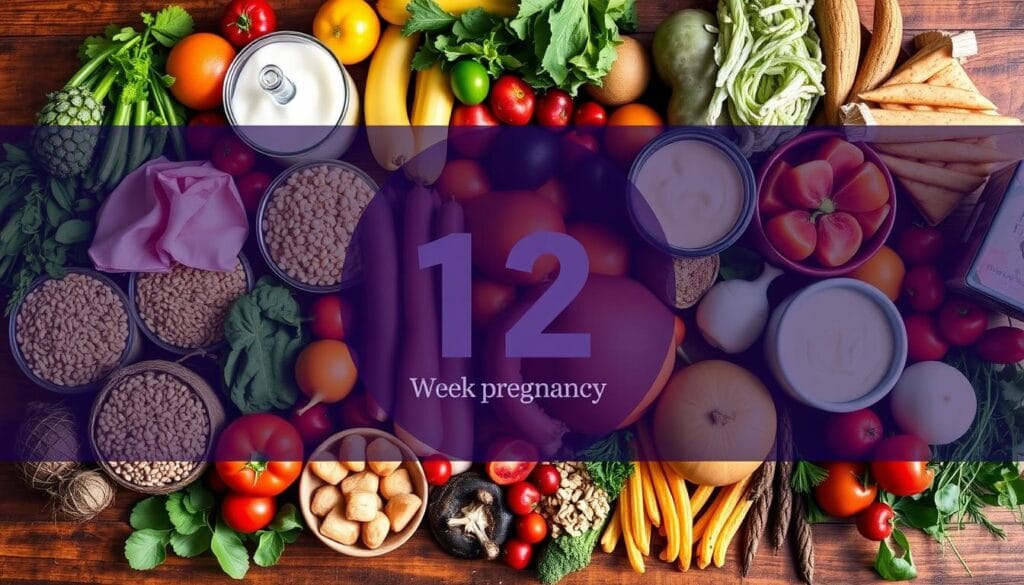Reaching week 12 of pregnancy brings a mix of feelings. You might feel excited, anxious, and curious. This time is key, and you’re likely wondering about your baby’s growth and your body changes. At 12 weeks, your baby is about 6 cm long and weighs 18 g. The risk of miscarriage drops significantly by the end of week 12, which is good to know.
Understanding what happens in week 12 can help you prepare for what’s next. You’re almost done with your first trimester, and your baby has grown a lot. The baby’s kidneys start working, allowing them to pass urine and swallow amniotic fluid. The placenta is also working hard, delivering oxygen and nutrients to the baby through the umbilical cord. Knowing what to expect at 12 weeks pregnant is important during this critical time.
Table of Contents
Understanding Week 12 of Your Pregnancy
Welcome to week 12 of your pregnancy! This milestone marks the end of the first trimester. It brings significant changes for both you and your baby.
At this stage, many of the pregnancy symptoms at 12 weeks start to lessen. You might notice reduced nausea and increased energy as your hormones stabilize. Your uterus has grown to the size of a large grapefruit. This helps relieve some pressure on your bladder.
Your baby is developing rapidly, measuring about 55mm and weighing approximately 18 grams. The placenta is now fully functional, providing essential nutrients and oxygen. Around this time, routine ultrasound scans are typically conducted. They check your baby’s development and assess the risk of certain genetic conditions.
Here are a few key aspects of week 12:
- Reduced Symptoms: Less nausea and fatigue as your body adjusts.
- Uterus Growth: Enlarges to accommodate your growing baby.
- Placenta Function: Takes over nutrient and oxygen supply.
- Baby’s Development: Significant growth and organ formation.
- Ultrasound Scan: Screening for developmental milestones and genetic conditions.
Consider enrolling in antenatal classes now, as they can fill up quickly. Following this week 12 pregnancy guide will help you smoothly transition into the second trimester. You can expect even more positive changes and developments.
Your Baby’s Development at 12 Weeks
At 12 weeks, your baby has grown a lot. This is a key time in their development. The tiny fetus is now about 2 to 2¼ inches long and weighs about half an ounce, like a lime.
Size and Weight Milestones
Your baby is getting bigger and heavier. They are now about 2 inches long. They are also gaining weight steadily, setting the stage for more growth in the weeks ahead.
Organ Development Progress
By week 12, your baby’s vital organs are well-developed. The heart works fully, and the digestive and immune systems are growing. The skeleton is turning from soft tissue to strong bone, allowing the baby to make gentle movements.
Physical Features Taking Shape
Human features are becoming clearer. Tiny fingers and toes are forming, and the baby’s facial structures, like eyes and ears, are in place. This stage shows how much your baby’s appearance is changing.
Common Symptoms You May Experience
When you enter the second trimester, you might feel a mix of relief and new feelings. Many women find that morning sickness gets better and they have more energy. But, it’s important to know about pregnancy symptoms in the second trimester to feel comfortable.
- Decreased urination frequency as your body adapts.
- Occasional headaches and bouts of fatigue.
- Feelings of bloating and increased gas.
- Excessive saliva, known as ptyalism gravidarum.
- Persisting sensitivity to smells even as nausea subsides.
To handle these changes, here are some week 12 pregnancy tips:
- Stay hydrated to manage bloating and fatigue.
- Incorporate pelvic floor exercises to support your body.
- Maintain a balanced diet with the recommended extra 300 calories daily.
- Consult your healthcare provider if you experience spotting or severe discomfort.
Knowing about these symptoms helps you enjoy the journey. It also makes sure you’re aware of your body’s changes.
Physical Changes in Your Body
At 12 weeks pregnant, you might start to see some changes. Your body is getting ready to support your growing baby. You’ll notice both inside and outside changes.
Uterus Growth and Position
Your uterus is growing and moving up. It moves from the pelvis to the front of your belly. This might make your belly slightly bigger, but it varies for everyone.

Weight Gain Expectations
Weight gain in the first trimester can vary a lot. Some women might not see much change yet. On average, you might gain 1-2 pounds by the end of the first trimester.
Things like your diet, how active you are, and your metabolism can affect how much you gain.
- Average Gain: 1-2 pounds
- Exceptional Cases: Some women may not gain weight in the first trimester
- Factors: Diet, exercise, metabolism
Skin and Hair Changes
Pregnancy hormones can cause changes in your skin and hair. You might see:
- More hair growth or changes in hair texture
- Skin color changes, like the “mask of pregnancy” or darker nipples
- Possible stretch marks as your skin stretches
Keeping your skin moisturized and eating well can help with these changes.
Important Medical Check-ups and Tests
At week 12, prenatal care during week 12 is key to watch over your health and your baby’s growth. Regular visits help make your pregnancy smooth.
Routine Screenings
Screenings include blood tests and ultrasounds. Blood tests check your blood type and Rh factor, and screen for diseases. Ultrasounds confirm your due date and check your baby’s growth.
- Blood Pressure Monitoring
- Urine Tests
- Weight Checks
Genetic Testing Options
Genetic tests like non-invasive prenatal testing (NIPT) are available. They screen for Down syndrome and other genetic issues. Talk to your doctor about the pros and cons.
Vaccination Requirements
Vaccinations are vital for pregnancy health tips at week 12. If you’re not immune, get the Measles–Mumps–Rubella (MMR) vaccine. Also, getting a flu shot protects you and your baby from flu.
Nutrition and Diet Guidelines
Keeping a balanced diet is key for your health and your baby’s growth during pregnancy. A week 12 pregnancy guide can guide you to make the best food choices.

Most women don’t need more calories until the third trimester. Make sure to eat foods rich in folic acid, iron, and calcium. The U.S. Public Health Service suggests 400 micrograms of folic acid daily to prevent neural tube defects.
- Include diverse proteins: Lean meats, beans, and nuts support your baby’s development.
- Eat plenty of fruits and vegetables: They provide vital vitamins and minerals.
- Choose whole grains: Foods like brown rice and whole wheat bread offer sustained energy.
- Stay hydrated: Drink plenty of water throughout the day.
Avoid foods like high-mercury fish, unpasteurized dairy, and undercooked meats. Small, frequent meals and healthy snacks can help with nausea and food aversions. Also, drinking enough water is important for pregnancy health tips at week 12.
Talking to a registered dietitian can offer tailored advice. They can help ensure you’re getting all the nutrients you need. This supports your health and your baby’s growth.
Exercise and Activity Recommendations
Staying active during pregnancy is good for you and your baby. It helps prepare your body for childbirth. Regular exercise brings many benefits.
Safe Workout Options
- Walking: A simple and effective way to stay fit. Aim for 30 minutes each day.
- Swimming: Water supports your weight, reducing strain on joints.
- Prenatal Yoga: Enhances flexibility and promotes relaxation.
- Strength Training: Use light weights to maintain muscle tone. Focus on controlled movements.
Activities to Avoid
While exercise is good, some activities are risky during pregnancy. It’s key to adjust your routine for safety.
- High-Impact Sports: Avoid activities like horse riding, downhill skiing, and ice hockey due to fall risks.
- Contact Sports: Sports such as kickboxing, judo, and squash should be avoided.
- Aerobic Exercises at High Altitudes: Scuba diving and exercising above 2,500 meters are not recommended.
- Exercises Lying on Your Back: After the first trimester, avoid lying flat on your back for extended periods.
Always listen to your body and talk to your healthcare provider before starting any new exercise. Following these tips ensures a healthy and active pregnancy journey.
Managing Common Discomforts
At 12 weeks, you might still feel some pregnancy symptoms at 12 weeks. Knowing how to handle these can make your journey easier.
Natural Remedies
There are many natural ways to ease common discomforts:
- Constipation: Eat more fruits and veggies, and drink plenty of water.
- Heartburn: Eat smaller meals and avoid spicy foods to lessen acid reflux.
- Dizziness: Eat regular meals to keep blood sugar steady and avoid sudden moves.
When to Contact Your Healthcare Provider
While many discomforts are normal, some need medical help:
- Severe or ongoing abdominal pain
- Heavy bleeding or unusual discharge
- Signs of dehydration, like dizziness that doesn’t get better with rest
Following these week 12 pregnancy tips can help you get through this stage safely. Always talk to your healthcare provider if you’re unsure about any symptoms.
Emotional Changes and Mental Health
Pregnancy brings a mix of emotions as you go through maternal changes at 12 weeks pregnant. Hormones can make you feel happy one minute and worried the next.
It’s normal to feel a lot of things. You might be thrilled about your baby or worried about your body changes.
It’s key to handle these feelings well. Here are some tips:
- Try mindfulness and deep breathing.
- Keep friends and family close.
- Do activities like walking or prenatal yoga.
- Make a daily routine.
If you’re feeling anxious or sad, talk to a doctor. Getting help early is good for you and your baby.
Don’t forget, your emotional health is as important as your physical health right now.
Planning Ahead: Second Trimester Preparation
As you enter the second trimester, it’s time to look forward and prepare for the months ahead. This is a crucial period for organizing and ensuring a smooth transition into the later stages of pregnancy.
Shopping Essentials
Start gathering the items you’ll need for your growing baby and your comfort:
- Maternity clothes that accommodate your changing body.
- Nursery furniture like cribs and changing tables.
- Early baby gear such as strollers and car seats.
- A baby registry to keep track of necessities.
Lifestyle Adjustments
Making slight changes to your daily routine can enhance your well-being:
- Modify your work schedule to reduce stress and fatigue.
- Establish a regular sleep routine to ensure adequate rest.
- Incorporate prenatal exercises to stay active and healthy.
- Begin practicing relaxation techniques to prepare for childbirth.
Embracing Your Pregnancy Journey Forward
By week 12, you’ve already made great progress. This is just the start of a thrilling time with more growth and changes ahead.
At 12 weeks, you might notice your belly growing and feel more energetic. Your senses could also get sharper, like your smell and taste.
It’s a good idea to document your journey. Keep a journal or take photos to remember your baby’s growth and your experiences.
It’s crucial to connect with your partner and support system. Talking about your feelings can make your relationships stronger and offer emotional support.
Don’t forget about self-care. Prenatal massages can relax you and improve blood flow. Trying new foods or gentle exercises is also good for you and your baby.
Staying informed about pregnancy can help you feel less anxious. Go to classes, read good books, or talk to healthcare providers to stay updated and ready for what’s coming.
Keep a positive outlook. Enjoy activities you love and stay in touch with other parents. This can make your journey happier and more fulfilling.

1 thought on “Week 12 of Your Pregnancy: What to Know”
Comments are closed.